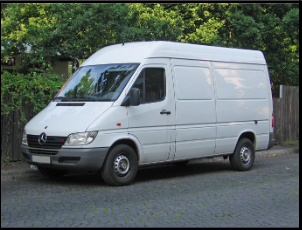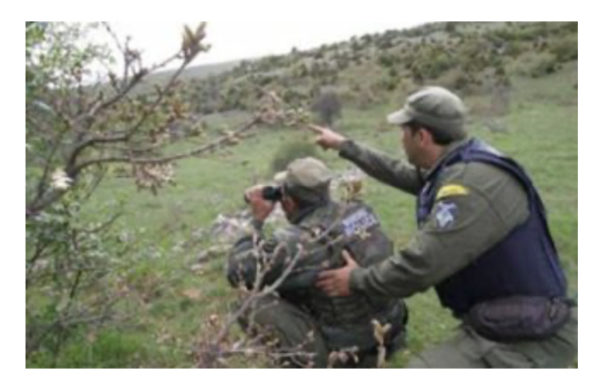The respondent, a 30-year-old man from Syria, recounts the fourth pushback he has been subjected to from Mikrochori, Greece, to Kiremitçisalih, Turkey, on the 26th of April 2022.
On the 25th of April at 8 pm, together with two men from Morocco, aged 27 and 30 years old, the respondents crossed the border near the Turkish town of Üyüklütatar. When the group arrived in Greek territory, the respondent saw that a drone with red lights was circling above them. The drone spotted by the respondent reportedly followed the group for around 30-minutes. The respondent stated that five minutes later, around 8.30 pm, the group was apprehended near the Greek town of Sakkos.
The respondent described that they were trying to hide in a dry river bed in-between farmlands. He recalls:
“Suddenly, I saw a big flashlight coming from the south and the flashlight was pointing exactly where we were hiding. I started seeing men coming toward us. We didn’t try to move or make any sound but they were getting closer and closer. Then, men started screaming and telling us to come out.”
The respondent saw seven men all wearing balaclavas. Three of the men, as described by the respondent, wore black uniforms with no logos or insignia and four men wore civilian clothes. The respondent described how the men started screaming “out out” and the men in black uniforms pointed hand guns at them. The respondent then stated that they [POM] came out of hiding and the men started kicking and beating them immediately. Reportedly, the men in civilian clothes were hitting the POM with plastic batons which continued for about ten minutes.
The respondent recalls that after 10 minutes, the group was told to sit down and give up their phones. When they sat down, as stated by the respondent, the beating continued. The respondent saw three cars, which, according to him, were the cars used by the uniformed men that apprehended them. He saw an olive green land cruiser, a black old model Skoda, and a black Ford pickup truck. Because he was forced to keep his face to the ground the respondent stated that he was not able to identify any logos on the car.
After 20 minutes, the respondent saw an unmarked white Mercedes van arriving to the scene (identified by the respondent as pictured below – Image 1). The respondent described how he and the other two men had to walk on an unpaved road to reach the van. The respondent saw one man, wearing a civilian t-shirt, camouflage pants, and a balaclava coming out of the car and talked to the six men that apprehended the POM in Greek. Then, as reported, the POM were then loaded into this van.

The respondent stated that they were brought to a detention site. The respondent described that the ride was fast and took around 10 minutes. Reportedly, it was around 9 pm when they arrived at the detention site. The respondent described the area as a one-floor building with dirty walls surrounded by a “big yard and surrounded by a fence. There was a big light lighting up the yard. The area was surrounded by forest. There was a junkyard in the back. There were caravans and houses approximately 500 meters from the fence of the detention site. There was one paved road in front of the detention center.” At the entrance of the detention site, the respondent saw a Greek flag on the fence.
The respondent recalled that there were five men at the detention site. Reportedly, one was the man that brought them there and four men were wearing sage green uniforms; a jacket and pants with black boots. These uniforms, as stated by the respondent had “written police in yellow letters on the left side of the chest with the same logo on the shoulders with Greek letters and a Greek flag”.
The respondent identified the uniform as seen in image 2 below.

Inside the building, the respondent saw something that he described as a big trash bin, and next to it he saw many backpacks; a box filled with Turkish water bottles, and food. The respondent stated that the officers told the POM to put their bags down and walk towards the wall. Then, as reported by the respondent, two men speaking English, told the POM to face the wall upon which they frisked them. The officer that frisked the respondent told him something which he couldn’t hear, then, as reported by the respondent, “he held my head and hit it to the wall and asked us to remove the pant belts and shoelaces”. The respondent stated that this took around 10 minutes.
It was around 8/9 pm, as per the respondent’s recollection, when they were brought to a cell. The respondent described the cell as being 5 by 3 meters big.
“The ground was dirty and there were four bunk beds with no mattresses. The walls looked old and there were several names written on them. There was a dirty smell inside that from the toilet. There were two empty cells and we were the first to get in there”.
The respondent stated that he was detained here for one day. During his stay, he described that during the day more people were brought in. At the end of the day, as recalled that there were around 70 people detained from Syria, Morocco, Algeria, Afghanistan, Pakistan, and South Sudan. The respondent recalls two women and six minors (between 15 and 17 years old) from Syria and Afghanistan. While being detained, the respondent stated that he didn’t sign anything, there was no translator present, he was not given water or food, and no fingerprints or pictures were taken.
The respondent recalled that at some point one man, wearing a black jacket and civilian pants opened the cell and told them to leave. This man, as described by the respondent, was holding a branch and when people left the cell he was hitting everyone with this branch on their back. Reportedly, the man was not hitting the women but he was hitting the minors. At the end of the hallway, the respondent saw four other men wearing civilian jackets and camouflage pants. The responded described that the men were escorting the POM to two vans and that they were beaten with the branches, which according to the respondent happened, “to make us walk fast”.
Outside, the respondent saw 13 other men in different uniforms. He reported three deep blue uniforms; a jacket and pants with written police in white letters on the chest, and a Greek flag on the arm; six men wore civilian clothes, “sport pants, civilian jackets and balaclavas” and they were holding tree branches; four were wearing a black uniform with nothing written on their uniform. All the men at the detention site, as reported, wore balaclavas.
The respondent described that the POM were escorted to two white unmarked vans that had no license plate at the back. The respondent identified the car as similar as pictured below. Inside the van, the respondent was with 30 other people. The respondent described that the ride was fast, reckless, and “bumpy’.
After 40 minutes, as recalled by the respondent, they arrived at the pushback location. When he was taken out of the car, the respondent saw a big forest on the side of the river and a small yard before the trees started. He also saw that the other white that he saw at the detention site also arrived at the push back location. Everyone was taken out of the trunk of the car and forced to form a line. The respondent stated that in order to enforce this line, the POM were kicked and hit with tree branches. The respondent stated that there were about 70 people; out of them, two women and six minors (between 15 and 17 years old) from Syria and Afghanistan. The respondent recalled that there were people from Syria, Morocco, Algeria, Afghanistan, Pakistan, and South Sudan.
At the pushback location, the respondent saw ten men that he referred to as “officers”. The respondent described six men in civilian clothes drove with the white vans to the pushback location. He also saw four men in green camouflage clothing with a Greek flag on their arms. Reportedly, the four men in green uniforms were holding a big gun and talking Greek.
The respondent described that the men in civilian clothes spoke different languages. The respondent knows Arabic and Kurdish and recognized that the men in civilian clothes spoke Kurdish and Arabic with a Syrian dialect.
The respondent stated:
“They told us that we had to give them everything we had. If they find something after they search us, they will beat us. They told us to keep silent and stay in line to be searched [..]”.
The respondent stated that women were searched by men and everyone had to give up their shoes. The respondent said that after he was searched, he was again kicked and beaten with the branch.
From here, the respondent described that people were taken to an inflatable gray boat that was white from the inside. The boat, as described by the respondent was three meters long and one meter wide that was operated by men paddling the boat. Reportedly, every time they brought nine people to the other side. The respondent mentioned that was in the last group that was pushed back. He recalled that there was one hour between arriving at the pushback location and the actual pushback. The respondent stated that the boat was not stable and that they were forced to leave the boat in the middle of the river.
After the respondent arrived in Turkey, he started looking for his friend. When they were reunited, as stated by the respondent, they walked for approximately thirty minutes when they arrived in a village. From here, they followed a paved road where the respondent saw a road sign that had written Kiremitcisalih and Edirne 65 kilometers on it. The respondent mentioned that on their way, a Turkish man gave them some bread and water. In the morning, after walking for 17 hours, the respondent stated that they arrived in Edirne.
In Greece, the respondent stated he was not allowed to talk and was not able to ask for asylum.
“We didn’t [ask for asylum] we couldn’t talk. All that you have to do to stay alive is follow their orders or you will get beaten and especially when you talk”.
